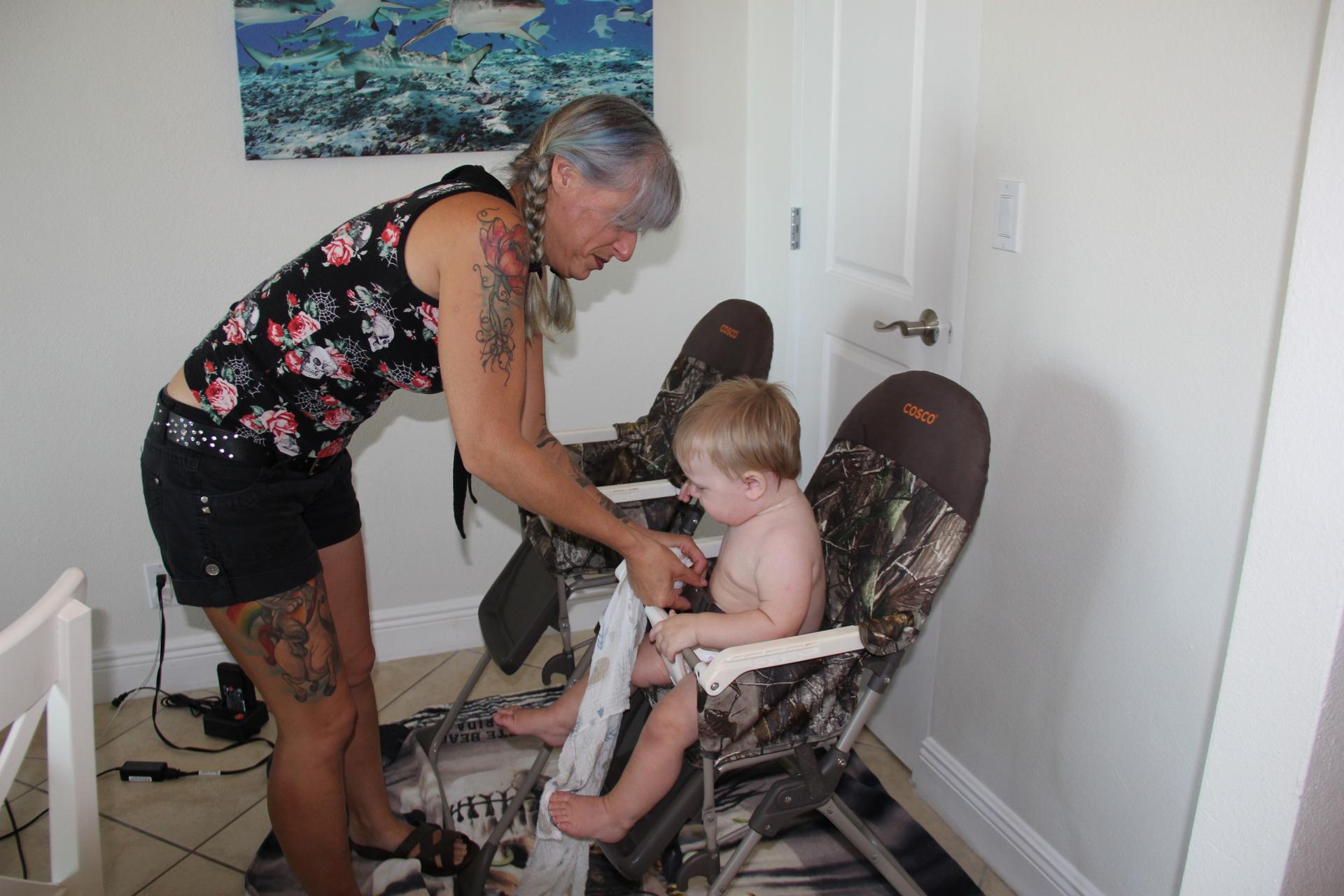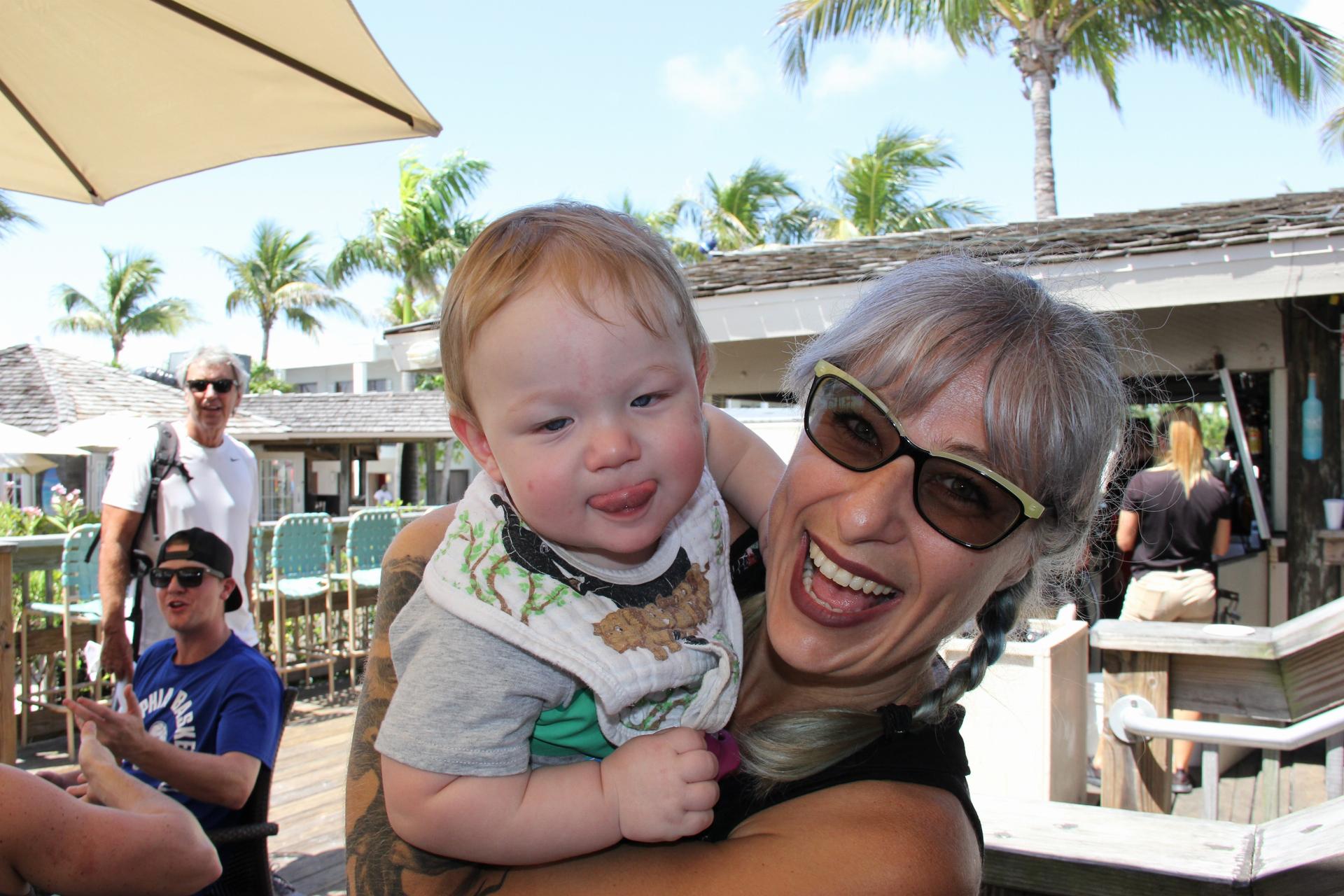In Ukraine, surrogacy is legal, but some ask if it’s exploitation
Kateryna (not her real name) lives in a rural village in Ukraine. She decided to become a surrogate so she could get ahead and earn extra money.
“We were never not trying,” said Bianca Smith, 43, about all the years she and her husband, Vinny Smith, spent trying to have a baby.
While sitting in her air-conditioned condo in South Pasadena, Florida, Bianca described her fertility woes. She’s lived in this coral-colored building for the last two years after moving from the UK. She wanted to go someplace sunny — unlike England, where she jokes the sun comes out only three days a year.
When Bianca and Vinny first got together, she warned him that she might not be able to conceive. It hadn’t happened with her previous husband in South Africa, where she’s originally from. Eventually, she divorced her first husband and moved to the UK, where she met Vinny on a dating site online. She was attracted by his smile, and they have been together since 2010.
This time, determined to have a child, she and Vinny decided to explore some nontraditional strategies to inspire fecundity: Reiki. Fertility massage. Fertility yoga. None of those methods proved successful. That’s when she begged Vinny to try in vitro fertilization, or IVF.

That means a doctor takes an embryo from one of Bianca’s ovaries, injects it with sperm and puts it back in her uterus. It’s supposed to result in pregnancy, but it’s not fail-safe. Bianca was 38 when she started IVF. She and Vinny were confident. They were thrilled when they found out Bianca got pregnant on the first try.
“First time was all excitement. I didn’t expect it to work. Everyone says you get three chances before it works. Our first one worked. I couldn’t believe it. I thought, ‘Our luck has changed.’ Then, I miscarried, and I was devastated.” Bianca wrote about her fertility struggles on her blog, Where’s My Stork. She also connected with a lot of other women through Facebook about the experience, which she says was an emotional roller coaster. All total, Bianca tried IVF eight times.
Each year, thousands of couples struggling with infertility turn to IVF, but without success. About 10 percent of women ages 15-44 in the US, or 6.1 million women, have difficulty getting pregnant or staying pregnant, according to the Centers for Disease Control and Prevention.
‘When failing at IVF, you feel your age more’
Bianca and Vinny tried IVF treatments for several years. They went to clinics in the Czech Republic and Spain after they failed with their fertility doctor in the UK. Studies show that fertility drops dramatically from your mid-to-late 30s, and, at 38, that might be why it was hard for Bianca to conceive.
“When failing at IVF, you feel your age even more,” Bianca said, describing the mood swings she experienced while taking the fertility drugs. It affected her mental health and tested her relationship with Vinny — they almost split up. “It makes or breaks a couple.”
Then, someone in a Facebook group she belonged to brought up the idea of surrogacy — something she didn’t know anything about. She called around and was shocked by the cost. “If we don’t have $100,000 to start, it’s not going to happen; $100,000 is the base.”
Several industry insiders echoed that figure; they told PRI that the industry standard in the US is between $100,000 and $150,000. That’s if nothing goes wrong. The price doesn’t account for any complications in pregnancy or extenuating circumstances — like if the newborn needs to be placed in the neonatal intensive care unit, for example.
It looked like surrogacy wouldn’t be an option for Bianca and Vinny. The couple had already spent more than $200,000 on IVF treatments. They had exhausted their savings, spent the inheritance from Vinny’s grandparents and asked for loans from their family members. They needed results and agencies in the US didn’t offer that. That’s when Bianca heard about Ukraine. She’d never been there and didn’t know anything about the country.
If they were going to move forward, Vinny had a condition.
“He said, ‘Yes, I’ll consider surrogacy if you find me a money-back guarantee.'” Bianca said all the agencies laughed at her when she asked for that. But someone told her about a clinic in Ukraine where you pay once and try as many times as you need to get a “take-home baby.”
So, the couple went for it. They sold their home and paid $58,000 to one of the largest fertility clinics in Ukraine. They bought the “VIP package,” which allowed for as many tries as it takes.
In Ukraine, the international commercial surrogacy business is taking off. But it’s not for everyone. The conservative, predominantly Christian country only allows married heterosexual couples like Vinny and Bianca to hire a surrogate. But the demand is growing. That’s because the price of surrogacy there has been dropping.
Ukraine has been a country in crisis for years. In 2004, there was an uprising called the Orange Revolution. A decade later, Russian-backed President Viktor Yanukovych was overthrown. Then came Crimea, annexed by the Russian Federation in 2014 — and Russia took control of parts of eastern Ukraine. All of this has led to a weak economy and fewer opportunities, especially for women who want to get ahead.
As a result, clinics and agencies in Ukraine see women who need money signing themselves up to be surrogates. And there are clients like Bianca and Vinny who want to have children.
So they flew to Ukraine.
First, they chose an egg donor. Then Vinny gave his sperm and they chose a surrogate. It was all over in a week’s time and they were elated that they were finally going to have a child.
“We felt like we landed in the butter. Everyone was so charming. So friendly, professional,” gushed Bianca after she and Vinny came back from their meeting with a representative from BioTexCom, Center for Human Reproduction.
 Nine months later, their twin sons, Max and Alex, were born.
Nine months later, their twin sons, Max and Alex, were born.
Bianca said they got incredibly lucky with their surrogate, who agreed to be implanted with two embryos. They flew to Ukraine for the birth and Bianca said she and her surrogate got along instantly. They were cracking jokes through a translator and taking selfies in the delivery room before her labor began.
“She was incredible. We could hear other women in labor screaming but she was like, “huh” pop, “huh” pop. And I was like, ‘wow you are superwoman.'” Bianca still keeps in touch with the woman who had Max and Alex through Facebook messenger. They use Google translate to understand each other.
Bianca said it was hard leaving her when they were all discharged from the hospital.
‘No one is exploiting no one’
Tucked away in a neighborhood filled with trees about five miles from the center of Kiev sits BioTexCom. After I entered through a set of wrought iron gates I met Anastasia Aleksandrova. She’s one of the clinic representatives.
The grounds of BioTexCom have the feel of an Italian villa. There are three warmly painted buildings situated among flowered and manicured lawns. The word “Biotex” is spelled out in flowers in one spot.

This is where Bianca’s babies were created and implanted in her surrogate.
Aleksandrova led me on a tour as she took calls on her chirping cell phone. The clinic has state of the art medical facilities, about a dozen doctors, embryologists and nurses.
In one building, couples from all over fill out forms and sign documents. BioTexCom boasts clients from China, Romania, Australia and Spain, in addition to the US. In another building, I meet the women who are going to have babies for some of those clients. These women are surrogates who’ve traveled to Kiev from rural areas of Ukraine. Some have taken an overnight train and look a little tired.
I asked why they were here? Why do they want to be a surrogate? Speaking through our translator, one said, “The money. Why do you think? There is no money in Ukraine.”
The average wage in Ukraine is about $200 a month. That’s why some argue surrogacy is exploitation. Activists in the country say it’s a way for couples with money to rent the wombs of women living in poorer countries.
It used to be countries like India, Thailand and Mexico had large surrogacy industries. But all those countries have made it illegal in recent years and that’s created an opportunity for Ukraine to fill the gap in the market.
Aleksandrova bristled when I asked her about exploitation.
“No one is forcing no one. This is what I will say about exploitation. They make their choice not to have something very basic for living. No. But to have something extra,” she said.
In other words, these women are here of their own free will. And they need the money to get ahead. What do these women get paid as a surrogate? Bianca’s surrogate walked away with $13,000 after carrying twins. BioTexCom, however, is a multi-million dollar business with offices in Asia, Europe and North America.
Their website makes fertility treatments and accomodations for couples look like an ad for the beach resort Sandals. Except there is a baby to take home at the end. Bianca feels like they oversold in terms of the medical care their children received and the accomodations. Aleksandrova rolled her eyes when she heard negative feedback from former clients.
“You lived with infertiltiy for years and now you’re going to complain. Seriously guys, you got pregnant from the first attempt. Your kids are perfectly fine in perfectly well form. You’re going to complain that you’re apartment is only 70 meters?” Aleksandrova said.
BioTexCom isn’t the only clinic for surrogacy in Ukraine. There are lots. Some offer the same packages as BiotTexCom and pay their surrogates a similar fee. But few, if any, of those clinics offer their clients gender selection, as BioTexCom does. It’s a service some consider controversial.
“Have you ever dreamed about a certain sex for your child?” their website asks. “BioTexCom can make this dream come true. There are only two reliable ways to select the sex: sperm separation of the X (female) and Y (male) sperm, and IVF combined with PGD.”
BioTexCom has been around for nearly 10 years — guaranteeing babies. That’s led to criticism about how far they will go to make fertility possible. The company’s website proudly shows off a pregnant woman in her 60s — something Aleksandrova doesn’t deny. That’s an extreme case, but the company’s bread and butter is guaranteeing babies to couples like Bianca and Vinny. For Aleksandrova, that means taking care of the surrogates.
“We have a responsibility to intended parents and we have a responsibility to the surrogate. And we are responsible for her in front of her family.”
It’s a choice without a choice
Three hours outside of Kiev is where “Kateryna” lives. She’s 28, a slight woman, weighing maybe 100 pounds. She has blond streaks in her hair and perfect nails. Kateryna is not her real name. She asked me to protect her identity because the issue of surrogacy is still a sensitive topic in the country.
She had Bianca’s babies.
Down a narrow, unpaved road a few minutes from the center of town sits Kateryna’s new house. She bought it with the money she earned becoming Bianca’s surrogate. It has a high, wooden fence that surrounds her large garden that grows the cucumbers, tomatoes and potatoes she served me for lunch that afternoon we met. There are flowers all over, a chicken coop nearby and a bunch of geese that waddle around. The house is white with blue trim. Inside, she shows me her kitchen and the two rooms she and her husband cleaned up and remodeled. They installed new windows in the kitchen and removed piles of debris left behind by the previous owner.
Through a translator, Kateryna told me the house still needs some fixing up.
“First and foremost, we need to change the roof because it leaks,” she explained as we walked towards the back bedrooms, which also still need repair. The house doesn’t have running water and they also want to make the kitchen area a little bigger.
Before they bought this house, they were living in an apartment, supporting Kateryna’s sister and struggling to pay off medical bills. That’s when a friend told her about becoming a surrogate.
She tells me that initially her husband didn’t want her to do it, because it’s a small town and people will talk and gossip. But she said they needed the money and went ahead and made the long bus ride to Kiev to have the embryo’s implanted. She did it without telling him.
“At first he yelled at me, but then I said, ‘You’re working so hard to pay for everything’ and then he understood.”
Kateryna has two daughters of her own. One was born at the regional hospital where she lives and the other was born while she and her husband were on their way to the hospital — in the car. She said she felt more worried carrying Max and Alex than when she was pregnant with her own daughters. She went for every ultrasound for the boys, something she didn’t get when carrying her own children.
She had a better doctor as a surrogate, too. She said the woman who was her previous doctor wasn’t open to questions and wasn’t that helpful when she did ask.
Ukraine’s healthcare system is under a lot of scrutiny right now. Acting health minister Ulana Suprun vowed to make changes and improvements to a system known to be rife with corruption and waste. Speaking on BBC’s Hardtalk, she explained why.
“[Doctors] make very low salaries. They receive what they call ‘gifts’ from patients, which are cash payments made under the table. In other places around the world, that’s known as corruption,” Suprun said.
Maternal and women’s health will be affected by these reforms. Kateryna’s mom died a few years ago from cervical cancer. She never receieved a pap smear, a routine procedure that can detect the disease. There is a big push in Ukraine to make them more accessible.
When Kateryna went to BioTexCom to undergo surrogacy, she told the doctor there she should only get one embryo. But the doctor said no. She was healthy and strong enough for two.
“It’s not like I have a choice of how many I will carry,” Kateryna recalled.
Lawmakers and those who study surrogacy in Ukraine say there is a need for women like Kateryna to know more about what is allowed during the surrogacy process. Radmila Hrevtsova, the director of medical law at Taras Shevchenko University in Kiev, said it can be difficult for women living in rural areas to have access to information. Ukrainian laws allow for contracts stating the terms of surrogacy between the intended parents and surrogate, but those are often drawn up by the clinic. The surrogate often doesn’t have a lawyer.
Kateryna said she just signed the contract and didn’t really read it. She didn’t have a lawyer.
Radmila says the core issue is improving the country’s economy.
“If those ladies had the chance to support their children — if they had the chance to accomplish their life goals — they would probably not agree to become a surrogate.”
Dr. Olga Gayovych likens surrogacy to prostitution and other forms of exploitation. She is part of a feminist activist collective in Kiev.
“It’s actually a choice without a choice. These women, they’re not informed about the risks. Women in rural areas know less,” she said. “Women are fighting hard against poverty and they are faced with a choice of prostitution or surrogacy.”
Olga and the other women in her feminist collective are working to criminilize those who buy sex. Not the women who are doing it.
Kateryna doesn’t spend her time thinking about the ethics of surrogacy. For her, it’s about improving the life of her family. She still works the overnight shift in a bakery because she wants to fix up her house. The goal is to open a nail salon out of her house and make more money.
Before I left for Kiev, Kateryna told me that BioTexCom called her a few days ago.
“The people from BioTexCom called me and asked me how am I feeling, do I want to do it again,” she explained.
Kateryna is experienced, young and healthy. Clinics like BioTexCom want her, because there are so many more couples out there who want women like Kateryna to have their children.
For a price.
Kateryna says she’ll decide soon whether that price is enough to entice her to do it again.
We want to hear your feedback so we can keep improving our website, theworld.org. Please fill out this quick survey and let us know your thoughts (your answers will be anonymous). Thanks for your time!
